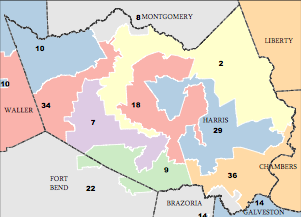Actual winner unclear in Supreme Court's ruling on Texas redistricting

By Lois Beckett, ProPublica
The Supreme Court ruled Friday that federal judges in Texas overstepped their bounds in drawing a minority-friendly set of interim maps for the state to use in the 2012 elections.
The Court ruled unanimously that the judges should have given more deference to the new district maps drawn by the Republican-controlled Texas legislature even though parts of these maps may discriminate against Latinos.
The Department of Justice has argued that the state legislature's plans would harm minorities and violate the Voting Rights Act. A panel of federal judges in Washington, D.C., is in the process of determining whether those plans did, in fact, break the law. Because that decision may not be made in time for the next elections, federal judges in San Antonio were tasked with drawing interim maps for the state to use. The maps used in Texas' next elections could impact the balance of power in Congress. They will likely determine whether the four new congressional seats awarded Texas via the census will be held by Democrats or Republicans.
The Supreme Court's decision leaves the fate of those seats in limbo. The maps created by Texas' legislature were seen as likely to give at least three of those new congressional seats to white Republicans, while the rejected maps drawn by the federal court in San Antonio were seen as more favorable to Democrats.
Instead of ruling that Texas should use either of these sets of maps, the Court sent the federal judges in San Antonio back to the drawing board, ordering them to base their maps more closely on the state's plan. They should make changes, the court ruled, only when there are specific legal challenges to the map that are likely to succeed.
The Court stated that judges have no business making their own policy choices via map lines. But how this decision will affect the maps Texas will use in the 2012 elections is unclear.
Texas' attorney general, Greg Abbott, who had challenged the federal judges' maps, celebrated the decision. "The Court made clear in a strongly worded opinion that the district court must give deference to elected leaders of this state, and it's clear by the Supreme Court ruling that the district court abandoned these guiding principles," Abbott said in a news release.
Abbott's office did not respond to a request for further comment.
But Luis Vera, an attorney for the League of United Latin American Citizens, which is challenging the Texas legislature's maps, said Friday morning that he saw the Supreme Court as primarily asking the federal court to better justify the changes it had made to the state's plan.
The federal court in Washington, D.C., that is reviewing Texas' plans said the legislature's maps are problematic. "The State of Texas used an improper standard to determine which districts afford minority voters the ability to elect their preferred candidate of choice," the court ruled in November, although the case is still ongoing.
Although some have interpreted the Supreme Court's ruling as a win for Republicans, it's not so clear that's the case. The justices' ruling seems to still allow the lower court to make substantial changes' to the Republicans' maps. The court said the judges should redraw maps in instances where "legal challenges are shown to have a likelihood of success." Since a federal court has already ruled that there are concerns with Republicans' map, that threshold may be easily met.
Texas had argued that the Supreme Court should allow the state to do an end run around the Voting Rights Act by granting the state permission to use the legislature's maps in the 2012 elections, even though they had yet to be "precleared" by federal judges in Washington.
Federal "preclearance" is a requirement imposed by the Voting Rights Act on states, like Texas, with a history of discriminating against minorities at the polls.
While the Supreme Court did not directly challenge the Voting Rights Act in its decision, as some observers had speculated might happen, it did note that the Court has "serious constitutional questions" about whether the preclearance mandated by the Voting Rights Act represents an "intrusion on state sovereignty."
"While [the decision] doesn't eliminate section 5 of the Voting Rights Act, it weakens it," said Matt Angle, a longtime Democratic redistricting strategist and director of the Lone Star Project, which has been supporting one of the plaintiff groups in the Texas redistricting lawsuit.
Angle said the Court's decision offers a way for state governments to temporarily dodge the full scrutiny of the law.
"It provides an incentive for states to draw discriminatory plans at the outset, and then stall and delay on preclearance so they can get as much of their flawed plans used in the next election as possible," Angle said.
The Court's decision also puts the burden of proof on citizens who are being discriminated against, rather than the politicians crafting discriminatory plans, Angle said.
But he said he expected the federal court in D.C. to rule against Texas' maps, and that the maps would be redrawn in time for the 2012 elections, which means "in practical terms, for this election," the ruling "doesn't have a great impact."
(Map of newly drawn Texas districts from Texas Legislative Council.)
Tags
ProPublica
ProPublica is an independent, nonprofit newsroom that produces investigative journalism in the public interest.
